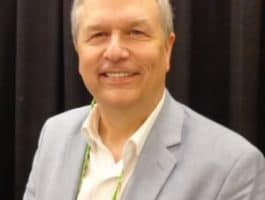
God Rest Ye Merry Gentlemen
Is decorating your tree with Santas, snowmen and elves getting a little humdrum? While cute, none of those reflect what the Christmas season truly is all about. For over 20 years Barbara Rainey wanted to adorn her home at Christmas in a way that focused on Christ, but couldn't find much in the stores to help her. So she got busy and created her own decorations that would reflect her faith. Barbara talks about her new resources, Adore Hymns and Adorenaments, while Ace Collins reveals the meaning behind "God Rest Ye Merry Gentlemen."
Show Notes
About the Host
About the Guest
-
Is decorating your tree with Santas, snowmen and elves getting a little humdrum? While cute, none of those reflect what the Christmas season truly is all about. For over 20 years Barbara Rainey wanted to adorn her home at Christmas in a way that focused on Christ, but couldn't find much in the stores to help her. So she got busy and created her own decorations that would reflect her faith. Barbara talks about her new resources, Adore Hymns and Adorenaments, while Ace Collins reveals the meaning behind "God Rest Ye Merry Gentlemen."
-
Dave and Ann Wilson
Dave and Ann Wilson are hosts of FamilyLife Today®, FamilyLife’s nationally-syndicated radio program. Dave and Ann have been married for more than 38 years and have spent the last 33 teaching and mentoring couples and parents across the country. They have been featured speakers at FamilyLife’s Weekend to Remember® marriage getaway since 1993 and have also hosted their own marriage conferences across the country. Cofounders of Kensington Church—a national, multicampus church that hosts more than 14,000 visitors every weekend—the Wilsons are the creative force behind DVD teaching series Rock Your Marriage and The Survival Guide To Parenting, as well as authors of the recently released book Vertical Marriage (Zondervan, 2019). Dave is a graduate of the International School of Theology, where he received a Master of Divinity degree. A Ball State University Hall of Fame quarterback, Dave served the Detroit Lions as chaplain for 33 years. Ann attended the University of Kentucky. She has been active alongside Dave in ministry as a speaker, writer, small-group leader, and mentor to countless wives of professional athletes. The Wilsons live in the Detroit area. They have three grown sons, CJ, Austin, and Cody, three daughters-in-law, and a growing number of grandchildren.
-

Ace Collins
Citing his Arkansas heritage, Christy Award winning author Ace Collins defines himself as a storyteller. In that capacity, Ace has authored more than seventy books for 25 different publishers that have sold more than 2.5 million copies. His catalog includes novels, biographies, children’s works as well as books on history, culture and faith. He has also been the featured speaker at the National Archives Distinguished Lecture Series, hosted a network television special and is the play-by-play...more
Barbara Rainey
After graduating from the University of Arkansas with a Bachelor of Arts degree in history, Barbara joined the staff of Cru® in 1971. With her husband Dennis, whom she married in 1972, the Rainey’s cofounded FamilyLife®, a ministry committed to helping marriages and families survive and thrive in our generation. Barbara is a frequent speaker and guest on FamilyLife Today®, FamilyLife’s award-winning nationally-syndicated daily radio broadcast. She is the author or coauthor of...more
Barbara talks about her new resources, while Ace Collins reveals the meaning behind “God Rest Ye Merry Gentlemen.”
God Rest Ye Merry Gentlemen
Bob: The meaning behind one of the best-known Christmas songs of all time may surprise you.
Ace: God Rest You Merry, Gentlemen has a very, very powerful meaning that we’ve lost. “Merry”—in the 1500’s and 1600’s, when this song was written—means “Mighty.” So, think of the song this way: “God make you mighty gentlemen, let nothing you dismay. Remember Christ your Savior was born on Christmas day.”
So, rather than saying, “Happy Christmas,” or, “Merry Christmas,” to each other this year, we need to be saying: “Mighty Christmas,” “Have a mighty Christmas,”—“Have a powerful Christmas,”—“Have a great Christmas!”
Bob: This is FamilyLife Today for Thursday December 12th. Our host is the President of FamilyLife®, Dennis Rainey, and I'm Bob Lepine. We’ll share some stories with you today about Christmas songs to help you have a more “mighty” Christmas. Stay tuned.
1:00
And welcome to FamilyLife Today. Thanks for joining us on the Thursday edition. Do you have a CD—a favorite Christmas CD you listen to every year?
Dennis: Actually, Barbara has a collection of CDs.
Bob: She’s in charge of the CDs?
Dennis: She is.
Bob: Yes, do you have one that you like better than others?
Barbara: Actually, I have to say that we did last year—is we just played Pandora®.
Bob: Really?
Barbara: Yes. We just had a better mix, and I enjoyed it because I played my CDs over and over again so much—and of course, you can’t change the order, and you can’t shift them up. I thought, “You know?”—so, we did Pandora; and that was my favorite thing.
Bob: Did you do a specific Pandora Christian Christmas or—
Barbara: Yes.
Bob: —yes; so, you could select down—
Barbara: Yes, I selected out the ones I wanted; and I chose that I wanted the Christmas Hymns—I don’t remember how I did it all.
Bob: No Rockin’ Around the Christmas Tree for you?
Barbara: No, not so much.
Dennis: That’s not her style.
2:00
Bob: If it’s playing, would you press the down arrow on Pandora?
Barbara: It kind of depends on my mood. [Laughter]
Dennis: Here’s the thing—Christmas time, I think, has some of the most magnificent music of all the seasons that we celebrate.
Bob: Yes.
Dennis: I don’t know if our listeners know this—many have heard of John Wesley—they may not, necessarily, know that his brother, Charles, wrote over 3,000 hymns in his lifetime.
Bob: Yes.
Dennis: Among them—
Bob: —is my favorite Christmas carol, Hark! the Herald Angels Sing—is Charles Wesley.
Barbara: That’s your favorite?
Bob: Oh yes!
Barbara: I thought you liked O Little Town of Bethlehem.
Bob: I like O Little Town of Bethlehem, but—
Barbara: —Hark! the Herald—is your favorite.
Bob: —just the theology ofHark! the Herald—
Barbara: Oh, I know.
Bob: —Late in time behold Him come,
Offspring of a virgin’s womb.
Veiled in flesh the Godhead see;
Hail the incarnate Deity,
Pleased as man with men to dwell,
Jesus, our Emmanuel.
You can’t get better than that at Christmas! That puts Rockin’ Around the Christmas Tree and Here Comes Santa Claus to shame; doesn’t it? Yes!
3:00
Barbara: Yes, I agree—which is why I push the down button and I ignore them because I really like the ones that have the great theology. I have to—can I tell you a story about last year?
Bob: Sure.
Barbara: Last year, Dennis and I were getting ready for—I don’t remember if it was a Christmas party or getting ready for our kids to come—but we were both working in the kitchen. Do you remember this?
Dennis: Oh yes! [Laughter]
Barbara: He was helping me do stuff, and I had the music going on the Pandora thing. This gorgeous, wonderful song came on. I don’t know what prompted us, but we started dancing to it. It was just—it was a worshipful dance—it wasn’t a romantic song. It was a hymn, and we started dancing to it. I felt like David dancing in worship. It was really a cool moment.
Bob: It’s really one of the reasons—I mean, you’ve been busy, Barbara, working on Christmas tree ornaments—the Adorenaments®—names of Jesus that can hang on a Christmas tree. You’ve been working on that for a couple of years. You developed the first set in the collection—which is His Christmas names.
4:00
The second set in the collection is His royal names. You’re working, now, on the third set—which is His saving names—that will come out next year.
Barbara: His Savior names—
Bob: Right. In the middle of all of it, you came in with these other ornaments that are about Christmas hymns—that aren’t about the names of Jesus. We all kind of looked at you and said, “Don’t you have enough ornaments to deal with?” But you just were passionate about these ornaments being added to what we offered to our listeners.
Barbara: Well, I think we all love Christmas carols. I don’t think there is anybody, who celebrates Christmas, who doesn’t love the music of Christmas. Music is a powerful force in our lives. Music calls us to something higher. Really—elegant, beautiful music calls our hearts to worship. It calls our hearts to the King.
So, I think that, because music is so central to the way we celebrate Christmas,
5:00
it makes it more meaningful when we understand the stories behind the carols themselves: “Who wrote them?”—why they were written—when they were written—how the music was added at a later date, oftentimes. Therefore, when we sing them, we know something about the background of the song itself. I think it makes the experience that much richer.
Bob: Well, I think our listeners really ought to go to FamilyLifeToday.com and look at the ornaments that you’ve designed—the ones that have the hymn names on them—the ones that have the names of Christ. Again, all of them are available, online, at FamilyLifeToday.com.
Dennis: Many of them, you can download these hymns and listen to as you hang them on the Christmas tree.
Bob: Our friend, Ace Collins, is with us this week. We’ve been talking with him about some of the stories of the great hymns of Christmas. He’s written a couple of books that detail the stories behind the songs of Christmas.
Ace, I’ve been curious about the song, God Rest Ye Merry, Gentlemen, because I’ve always been curious about the comma that seems, to me, like it’s in the wrong place.
6:00
I’ve always thought it was—I have!—I always thought it should be God Rest Ye, Merry Gentlemen but it is God Rest Ye Merry, Gentlemen. What is the story behind that song?
Ace: Well, I’ve wanted to find out the story behind this since I was a kid because I always wondered why you’d have a song where God wanted happy people to sleep. [Laughter] I mean, to me, it just did not work! I went back to Baylor University’s theological library—dug through a bunch of English texts from the 1500’s and 1600’s, when this song was written by some nameless peasant. We don’t know who wrote it.
By the way, most of the Christmas carols that we sing today in church were actually written outside the church. The church did not want Christmas music in the church because they wanted something that was theologically-sound. They didn’t believe that common everyday Christians could write theologically-sound verses to music. So, they discredited anyone who was not a priest or a pastor who wrote a song.
Dennis: Amazing.
7:00
Ace: So, all of these songs that we’re talking about, by and large, were sung by people at home, not in church. God Rest Ye Merry, Gentlemen is one of those. I wanted to find out what “rest” meant in the Old English language. It did not mean “sleep.” It meant “make” or “keep”—God Make You Merry, Gentlemen.” But there was something else I wanted to find out. I figure, “If the word ‘rest’ meant something different, maybe, ‘merry’ meant something different. Maybe, it wasn’t Robin Hood and his ‘happy’ guys out in the forest.” [Laughter]
Sure enough, it wasn’t. “Merry”—in the 1500’s and 1600’s, when this song was written—meant “mighty”—“mighty” or “great.” Think of the song this way: “God make you mighty, gentlemen. Let nothing you dismay. Remember Christ your Savior was born on Christmas Day.” So, rather than saying: “Happy Christmas,” or, “Merry Christmas,” to each other this year, we need to be saying: “Mighty Christmas,” “Have a Mighty Christmas,”—”Have a powerful Christmas,”—“Have a great Christmas!” That’s what that song means.
8:00
That song, which we kind of almost discredit in modern-day usage, has a very, very powerful meaning that we’ve lost.
Dennis: I think that’s a better phrase anyway. Somehow, “Merry Christmas,” has become trite and almost meaningless. If there has ever been a day—when we ought to have the courage that you’re talking about, and we ought to be mighty, as believers and followers of Jesus Christ—it’s today—and it ought to start at home.
Ace: Exactly! It’s a situation where—I always wanted to make a shirt that crossed out “Merry” and put “Mighty” over the top of it.
Dennis: You know what? We’re going to help you do this.
Bob: See if we can design something like that.
You mentioned that peasants were not supposed to write Christmas music because they were perceived as not theologically-astute enough. I mentioned, already, that one of my favorite Christmas songs is Hark! the Herald Angels Sing because of the profound theological truth that’s found in that song. Who wrote it?
9:00
Ace: Well, that was written—and there’s a lot of theological soundness behind that song. It was written by a man named Wesley—Charles Wesley—who is pretty well-known to most theologians who have studied much. He wrote Jesus Christ is Risen Today—Love Divine, All Love Excelling. This is a man who had to have everything theologically-sound in everything that he wrote.
He wrote this back in 1737. He was also kind of a rebel in his own way. He was leading people in his own version of what the church should be. He was a dynamic leader who wasn’t afraid to go down a different path—but like a lot of people, who were involved in various things—this leader of the Methodist movement in England—also would not allow anything to be changed that was not biblical.
If you actually read the original text—it is: Hark! How All the Welkin Rings.
10:00
He refused to translate it where people could understand it. That was his way of saying: “It was going to be sung that way or nothing else!” So, Wesley had a man named Winfield—that re-wrote the whole song and then took it to a guy named Cummings, who Wesley had never met, and changed the tune.
Now, it’s really funny because Wesley did not believe in even having the tune—one note of the tune changed in any of his songs. So he died, and what do they do? They immediately take his favorite song and give it to a German who re-writes it; okay? [Laughter] Then, the German takes it and combines it with another thing. So, you have this man, who has studied under Mozart and Beethoven, who Wesley, by the way, did not like. He did not like the “music of the Huns”—as he referred to it as. They took this song, and they combined it; and they came up with Hark! the Herald Angels Sing. Ironically enough, the verse—the music that was written to this song—was actually written to celebrate the invention of the printing press.
Bob: Really?
11:00
Ace: Yes. So you have two people who—once again, the writer of the music didn’t believe his music should be matched to anybody’s words but his own—but two people, who were too stubborn in life to get together—who got together, after death, by an arranger—to create one of the most lasting Christmas carols of all time.
Bob: Well, and one of those that, again, just drips with theological truth:
Hail the heaven-born Prince of Peace!
Hail the Son of Righteousness!
Light and life to all He brings,
Risen with healing in His wings.
Mild He lay his glory by,
Born that man, no more may die,
Born to raise the sons of earth,
Born to give them second birth.
I mean, you can’t do much better than that; can you?
Dennis: You really can’t. The words have such nobility, and they lift the heart heavenward.
12:00
There’s another song or two that I want you to comment on. One is Joy to the World.
Bob: Joy to the World is actually not a Christmas song; is it?
Ace: No,Joy to the World really is taken from the Old Testament. It’s taken from Psalms. It is a situation where it was written by—once again, a very, very well-known member of the early Christian church in England—Isaac Watts. Watts, who had written so much that was so powerful, wrote this after reading a segment of Psalms.
He wrote it, not as a New Testament psalm, but as an Old Testament psalm. Therefore, if you actually listen to it, it has a lot of New Testament meaning to us—but it kind of evolved into being a Christmas hymn—
13:00
but it was not, originally, a Christmas hymn.
Bob: Isaac Watts was kind of a rebel. In those days, you weren’t supposed to sing anything but the Psalms, and he wanted to sing about Christ. He went to his dad, and he complained. His dad said, “Well, you write some songs then.” He wound up going back to the Psalms and finding Christ in the Psalms. Joy to the World, as you said, is taken from the Psalms—
Ace: Psalm 98.
Bob: Yes.
Ace: It’s a situation where, when you look at it—We’re Marching to Zion, When I Survey the Wondrous Cross, This Is the Day the Lord Hath Made, and things like that—realistically-speaking, he became the first English hymn writer. I mean, before that, they really did just sing the Psalms. He became a hymn writer who influenced people, and really took testimonies and put them into hymns. Before that, it wasn’t done.
14:00
Dennis: I’ll bet you know the origins of Jingle Bells.
Ace: Jingle Bells—Medford, Massachusetts, about 1840. A man named Pierpont got stuck with an assignment because he was a preacher’s kid. His dad said, “Write something for our youth choir to sing at Thanksgiving.” Well, the man went outside when he could write nothing—on Mystic Avenue, there in Medford—and was watching a bunch of kids drag-race sleighs, behind horses—the bells on them—the whole shot.
15:00
The girls, who were watching, were rooting for their boyfriends drag-racing these sleighs. Picture hot-rodding inspiring a song, and you have where this came from.
Dennis: So, there is no Christian meaning behind it.
Ace: There is no Christian meaning other than the fact that it was first sung in a church by a children’s choir. Now, I understand the pastor was quite distressed over what his son had written to be sung in church; okay? But everyone who was there loved it, that Thanksgiving. They demanded that it be sung again at the Christmas program.
A month later, when they had the Christmas program—and all their old members came back from New York, and Boston, and these places—they heard this song, Jingle Bells. What happened is—they took that song back with them to their own churches and their own people. It became a Christmas song that really was Thanksgiving in nature. Not only that—but if you think about it—the horse-drawn sleigh and everything else, suddenly, became a symbol of Christmas. It wasn’t before—with the jingle bells and all that. So, we owe a tremendous amount of our Christmas traditions that was written for kids at Thanksgiving.
16:00
Bob: Pierpont is a little like one of the early Beach Boys; huh?
Ace: Exactly, yes. I can imagine that—you know, writing on an old piano on Mystic Avenue and came up with Jingle Bells. If you actually look at all the words, it talks about dating, and betting on horse races, and everything else. [Laughter] So, it’s not a Christmas song that we think of being—that envelopes the spirit of Christmas.
It’s kind of like—there was a movie—Bob Hope desperately wanted a Christmas song because his best friend was Bing Crosby. Bing Crosby scored so well with White Christmas. Bob desperately wanted a song that would be his White Christmas. When he made the movie, The Lemon Drop Kid, the composers—who were famous Broadway composers, at the time—wrote the music for that. In the midst of that, they wrote a song—that was a Christmas song—about a tiny little bell they had sitting on their desk. They knew they had written a hit.
They went back to their wives. and they sang the song.
17:00
Their wives, knowing it was a Bob Hope movie, fell off the couch laughing and said: “Hope will love it! It’s the funniest song we’ve ever heard!” They said: “What do you mean it’s the funniest song? This is supposed to be a serious moment in the movie!” They had written the song and titled it after the bell that was on their desk, which was a tinker bell. So, the song that they’d sung that day to their wives was: “Tinker bell, tinker bell, it’s Christmas-time in the city.” [Laughter] Which, somehow, does not really work; does it?
Bob: No.
Ace: Well, Hope listened to it and loved it. They put it in the movie. Sadly enough, Crosby saw the movie before Hope had a chance to cut the song. Crosby went in, and cut it, and had the hit on i! [Laughter]
Dennis: So, Bob never got his Christmas song.
Ace: No, he never got his Christmas song. So, that was one of the funny things. There are a lot of Hollywood songs. The other one that I think is really cool is “Chestnuts roasting on an open fire”—The Christmas Song—written by Mel Tormé. Most people today know Mel Tormé from appearing on The Night Court—you know, the old show, The Night Court, where he played Judge Harry Stone’s idol. Tormé, though, was a great songwriter.
18:00
He was stationed in LA to write, once again, movies’ songs.
He could not come up with anything on this hot day that he wrote with his songwriter. To keep cool, because the air conditioner didn’t work—in the 1940s, they actually wrote words that reminded them of their youth in New England in cold weather.
[Excerpt of The Christmas Song]
They were just writing things to try to make them cool. When they realized they’d written something special, they immediately took it over to Nat King Cole. Even though it was July and August, Nat King Cole went ahead and recorded the song to beat Crosby to it—is what was later said. It became the first-ever Christmas song introduced to the world by an African-American.
Therefore—like Jackie Robinson tore down the race barrier in baseball—
19:00
Nat King Cole and The Christmas Song tore down the barrier in Christmas music. I’ve always said that this particular song really allowed America—not just to have a white Christmas, but to have a black Christmas, as well.
Bob: There’s one other song in your book that has its roots in the black church. It’s the spiritual, Go Tell It on the Mountain—that whites and blacks today both sing; right?
Ace: Not only the black church—but the fields of slaves.
[Excerpt of Go Tell It on the Mountain]
I mean, these were slaves who wrote this song. Some unknown slave wrote Go Tell It on the Mountain. Now, if you listen to the powerful words and imagery in Go Tell It on the Mountain, it’s obviously written by a believer. But it’s also written by a man who, though he can sing about the freedom that comes with Christ’s birth, could not experience that freedom in his own life.
I think it is such a powerful testimony of faith—that a man who really is encased in the bonds of slavery—was still so moved that he gave us this song.
20:00
How many hundreds of these songs did we lose? We don’t know. But, thanks to the Work family of Nashville, after the days of the Civil War, and the Fisk Jubilee Singers from Nashville, this song was saved. I think it’s one of the most powerful Christmas songs ever written.
Bob: I think, though—if Barbara was going to re-write it today—she would write it: Go Tell It on the Christmas Tree because that—wouldn’t you? [Laughter] That’s what it would be! Forget the mountain.
Barbara: You can tell it on the mountain; but at Christmas time, you tell it on the Christmas tree. [Laughter]
Dennis: She is telling it on the Christmas tree. In fact, Bob, I got an e-mail and a picture from Ivan and Linda DeNoso, who live in Southern California, who decided they would decorate a Christmas tree with the Adorenaments—the names of Christ—the Christmas names. They sent a picture with those names. It’s in the lobby of their company where they work. They wanted everybody to know—all the vendors they work with, all the customers that they have—who was King of kings and Lord of lords.
Bob: Sounds like the Christmas tree we had in our lobby last year and the one that we have down there,
21:00
this year, that is all decorated with the—
Dennis: It’s got more names this year.
Bob: It does. It’s got the royal names in the shape of the crowns—it’s got the Christmas names. There are some Adore Hymn—hymn ornaments—scattered around, as well. Let me encourage our listeners: “Go to FamilyLifeToday.com and see the work that Barbara has been doing. See what these ornaments look like; and consider whether you want to order them for your tree—order them to give as gifts to friends, or family members, or relatives, or neighbors as Christmas gifts this year. It’s a great way to spread the true meaning of Christmas in the neighborhood or at the office.” Again, go to FamilyLifeToday.com; or call 1-800-FL-TODAY to find out more about Barbara’s Adorenaments and about the Adore Hymn ornaments. FamilyLifeToday.com is the website, and the toll-free number is 1-800-FL-TODAY.
You might also want to consider getting the box set of three books from Ace Collins—Stories Behind the Best-Loved Songs of Christmas, Volumes 1 and 2
22:00
—and Stories Behind the Great Traditions of Christmas. These stories are short. You can read them at the dinner table; you can sing a Christmas carol together, as a family. You can use these stories to help prepare your heart for the celebration of the birth of Jesus.
Again, go to FamilyLifeToday.com; or call 1-800-FL-TODAY. We’ll get the books or the ornaments out to you.
Let me also encourage you to get in touch with us, here in the last few weeks of December, as we head toward the end of 2013. FamilyLife Today listeners have always been very generous at year-end to FamilyLife Today. In fact, I think the numbers I saw most recently—more than one-third of our annual donation revenue comes in during the month of December. December is a pretty strategic month. If listeners are generous in making a year-end contribution, it sets the tone for the kind of year 2014 can be,
23:00
here at FamilyLife Today—what kind of ministry we’ll be able to do.
This year, we’ve had some friends of the ministry who want to promote and encourage maximum generosity. What they’ve done is—they have agreed that they will match every donation we receive from FamilyLife Today listeners, three-to-one. So, you send in a $25 donation; and they will match it with $75, for a total of $100. They’ll do that up to a grand total of $500,000. If we can get $500,000 from FamilyLife Today listeners, that means $2 million will be available for ministry in the year to come. We want to ask you to, first of all, pray for us—that we’ll be able to take full advantage of this matching gift—that listeners will respond generously.
And then, if you are able to respond, go to FamilyLifeToday.com. You can click the button that says, “I CARE”, to make an online donation. Or call 1-800-FL-TODAY to make a donation over the phone.
24:00
Or you can mail a donation to FamilyLife Today, at
PO Box 7111, Little Rock, AR. Our zip code is 72223. And, again, we want to say: “Thanks for your financial support through the years.” Again, “Thank you,” in advance, for whatever you are able to do this year.
And let me encourage you to join us again tomorrow when Ace Collins is going to be back with us—so is Barbara Rainey. We’ll talk more about some of your favorite Christmas hymns tomorrow. I hope you can tune in for that.
Bob: I want to thank our engineer today, Keith Lynch, and our entire broadcast production team. On behalf of our host, Dennis Rainey, I'm Bob Lepine. We will see you back next time for another edition of FamilyLife Today.
FamilyLife Today is a production of FamilyLife of Little Rock, Arkansas.
Help for today. Hope for tomorrow.
©Song: The Christmas Song
Artist: Nat King Cole
Album: The Christmas Song (p) 2003 Capitol
©Song: Go Tell It on the Mountain
Artist: Mahalia Jackson
Album: Songs for Christmas (p) 1962 Columbia
We are so happy to provide these transcripts to you. However, there is a cost to produce them for our website. If you’ve benefited from the broadcast transcripts, would you consider donating today to help defray the costs?
Copyright © 2013 FamilyLife. All rights reserved.
1




